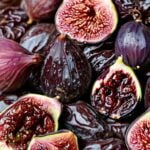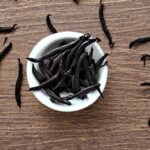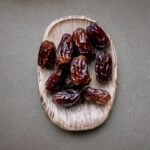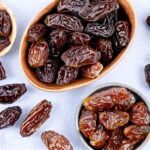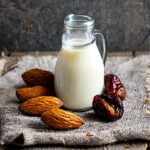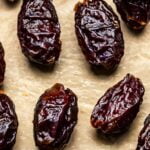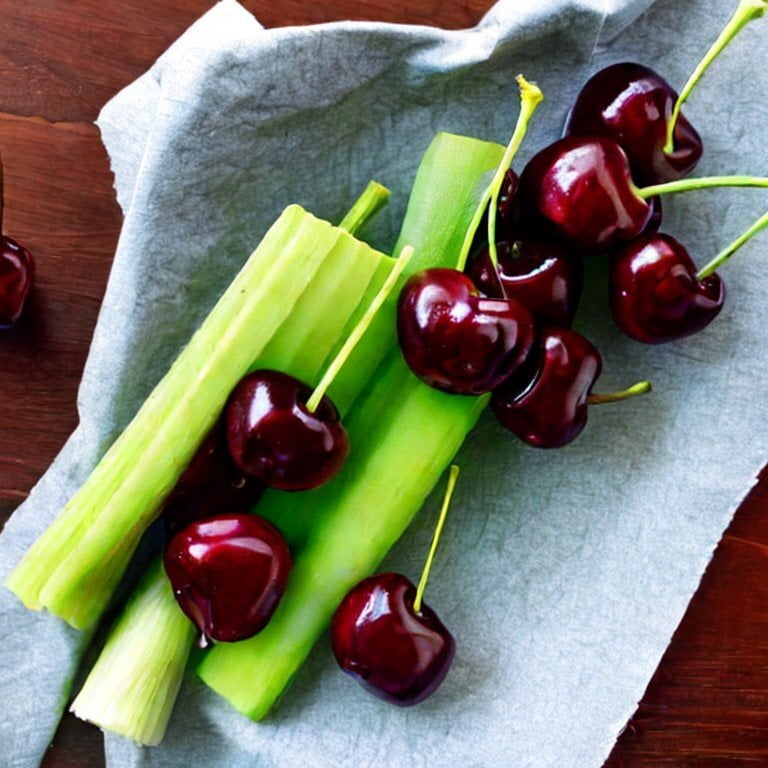
In this post, we will explore both fruits and vegetables that start with C (the letter “C” in the English alphabet). We will start with the fruits that begin with C first, and then look at the C letter vegetables.
(You may also be interested in the separate posts Fruits that Start with C and Vegetables that Start with C)
Table of Contents
Fruits that Start with C
First we’ll have a look at the fruits that begin with the letter C. These fruits include:
Cantaloupe
A cantaloupe is a type of melon with a hard, scaly rind and a sweet, juicy flesh. It is native to the region around the Mediterranean Sea and has been cultivated for thousands of years. Cantaloupes are round or oval in shape and can range in size from small to large.

They are a popular fruit because of their sweet, refreshing taste and their high content of vitamins and minerals. Cantaloupes are often eaten fresh, either by themselves or as part of a fruit salad, and can also be used in a variety of dishes such as soups, salads, and smoothies.
Carambola
A carambola, also known as star fruit, is a tropical fruit that is native to Southeast Asia. It is named for its shape, which is reminiscent of a star when it is sliced crosswise. The skin of a carambola is thin and smooth, and can range in color from green to yellow.
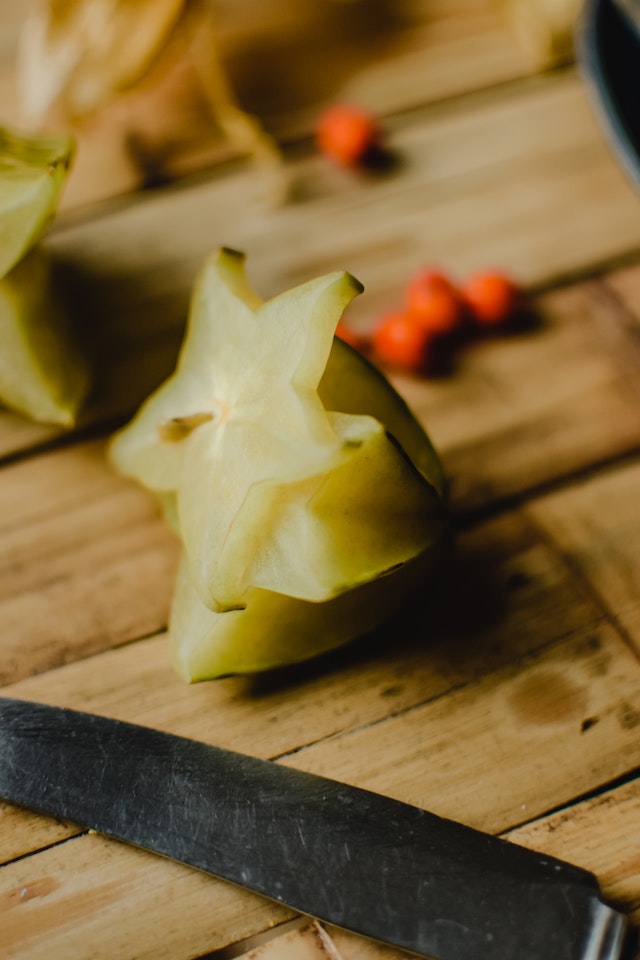
The flesh is white or yellow and has a juicy, crunchy texture. Carambolas are a popular fruit because of their unique shape and sweet-tart flavor, and are often eaten fresh or used in salads, smoothies, and sorbets.
They are a good source of vitamins C and B, as well as potassium and fiber.
Cherries
Cherries are a type of small, round, and juicy fruit that comes in a variety of colors, including red, black, and yellow. They are a good source of Vitamin C, fiber, and antioxidants.

The fruit is often eaten fresh, but can also be used in pies, jams, and jellies.
Casaba Melon
A casaba melon is a type of melon with a yellow or green skin and a white or green flesh. It is named for the region in which it was first cultivated, the Kasaba region of Turkey.
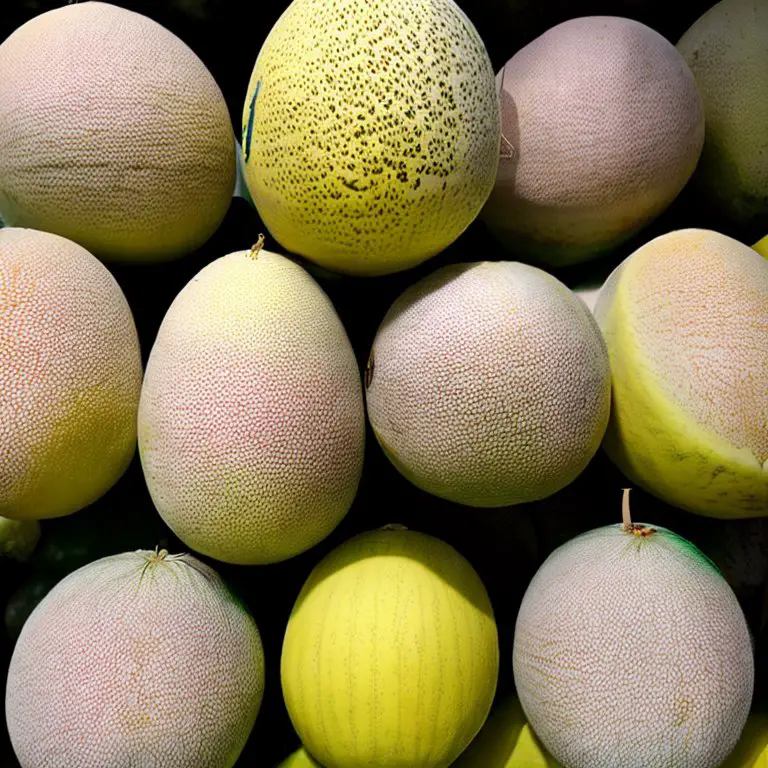
Casaba melons are typically round or oval in shape and can range in size from small to large. They have a hollow center with seeds surrounded by a thick, juicy flesh.
The skin of a casaba melon is edible, but it is usually removed before the fruit is eaten. The flesh of a casaba melon is sweet and juicy, and has a mild, slightly cucumber-like flavor.
Casaba melons are often eaten fresh, either by themselves or as part of a fruit salad. They can also be used in a variety of dishes, such as soups, salads, and smoothies.
Coconuts
The coconut is the fruit of the coconut palm tree, it’s a large, hard-shelled fruit that contains a white, fleshy, and juicy interior. The flesh of a coconut is high in saturated fat, protein, Vitamin C, and potassium.
The fruit is often used in desserts, curries, and drinks. The water inside a coconut is also a good source of hydration.
Cherimoya
A cherimoya is a tropical fruit that is native to South America. It has a green, bumpy skin and a sweet, creamy white flesh.
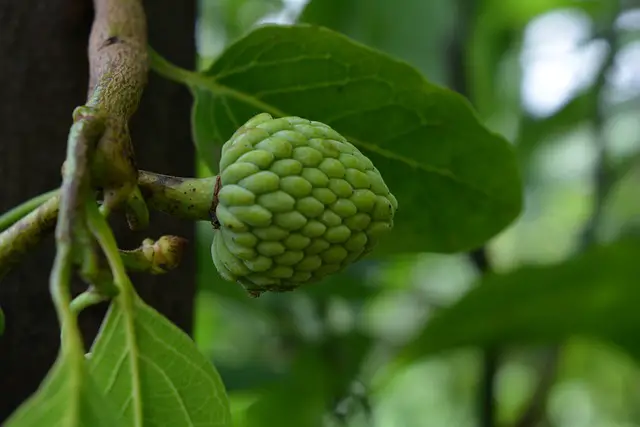
Cherimoyas are typically oval or pear-shaped and can range in size from small to large. The skin of a cherimoya is inedible and must be removed before the fruit is eaten.
The flesh of a cherimoya is soft and juicy and has a sweet, tropical flavor that is often described as a combination of pineapple, banana, and papaya. Cherimoyas are a popular fruit because of their unique flavor and texture and are often eaten fresh, either by themselves or as part of a fruit salad. They can also be used in a variety of dishes, such as smoothies, ice creams, and sorbets.
Citron
A citron is a large, lemon-like fruit with a thick rind and a sour, acidic flesh. It is native to Southeast Asia and has been cultivated for thousands of years. Citrons are typically oval or oblong in shape and can range in size from small to large.
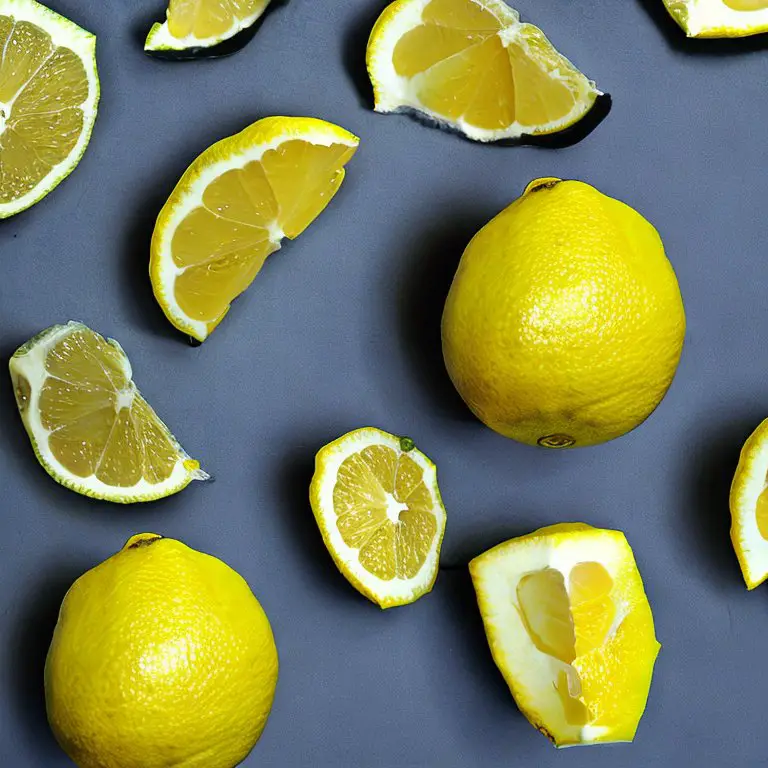
The rind of a citron is very thick and is often used to make candied fruit or preserved in syrup. The flesh of a citron is pale yellow and is not often eaten by itself because of its sour flavor.
It is often used in a variety of dishes, such as preserves, marmalades, and candies. Citrons are a popular fruit in many parts of the world because of their unique flavor and their high content of vitamins and minerals.
Clementine
A clementine is a small, sweet citrus fruit that is similar to a mandarin orange. It is a hybrid of a mandarin orange and a sweet orange, and was first cultivated in 1902 in the town of Clementine, Algeria.

Clementines are typically round or oval in shape and are smaller than most oranges. They have a smooth, thin skin that is easy to peel, and a juicy, segmented flesh that is sweet and flavorful.
Clementines are a popular fruit because of their small size and easy-to-peel skin, which make them a convenient and healthy snack. They are often eaten fresh, either by themselves or as part of a fruit salad, and can also be used in a variety of dishes, such as salads, desserts, and cocktails.
Cactus Fruit
Also known as prickly pear, the cactus fruit is the fruit of several cactus species. It has a sweet and juicy flavor and is high in Vitamin C and antioxidants. The fruit is often eaten fresh, but can also be used in juices, syrups, and jams.
Cocona
Cocona is a tropical fruit native to South America. It has a yellow or orange skin and a sour, acidic flesh.
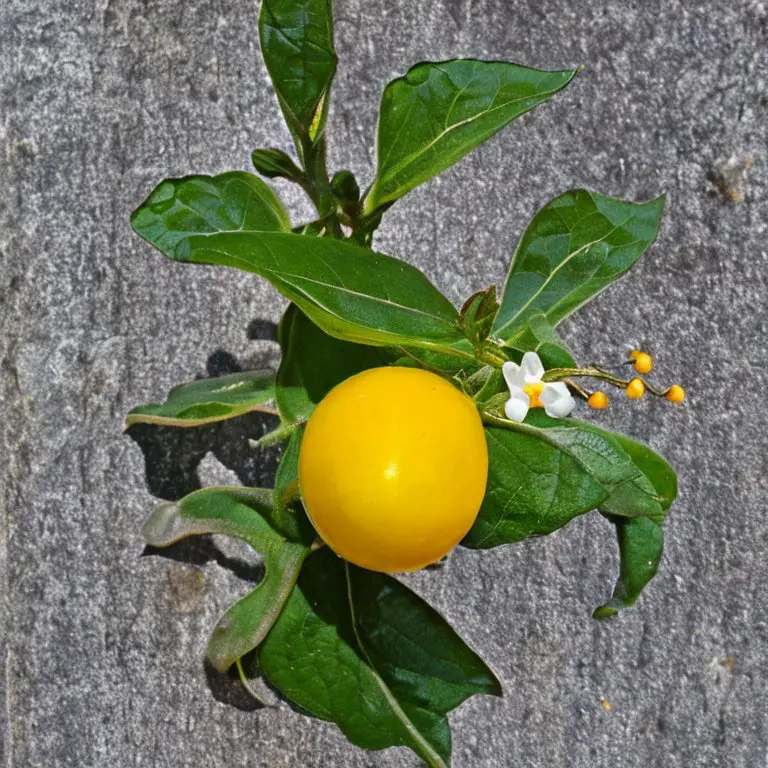
Coconas are typically oval or pear-shaped and can range in size from small to large. The skin of a cocona is thin and smooth, and is often eaten along with the flesh of the fruit. The flesh of a cocona is white or yellow and has a juicy, crisp texture.
Coconas are a popular fruit because of their unique flavor and high content of vitamins and minerals. They are often eaten fresh, either by themselves or as part of a fruit salad, and can also be used in a variety of dishes, such as soups, salads, and smoothies.
Cactus Pear
Also known as Tuna, it’s the fruit of several cactus species. It has a bright red or yellow color and a sweet taste. It’s high in Vitamin C and antioxidants. The fruit is often eaten fresh or used in jams, jellies and syrups.
Cocoplum
A cocoplum is a small, round fruit with a purple or black skin and a juicy, sweet flesh. It is native to the Americas and has been cultivated for thousands of years.
Cocoplums are typically about the size of a cherry and have a smooth, shiny skin. The flesh of a cocoplum is white or pink and has a juicy, sweet-tart flavor.
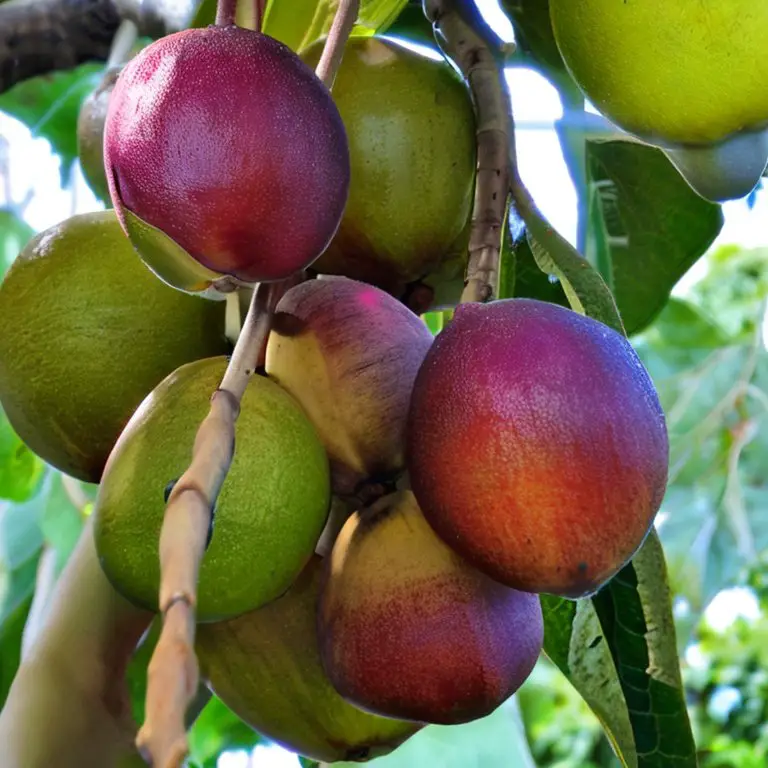
Cocoplums are a popular fruit because of their unique flavor and high content of vitamins and minerals. They are often eaten fresh, either by themselves or as part of a fruit salad, and can also be used in a variety of dishes, such as jams, jellies, and preserves.
Cranberry
A cranberry is a small, red fruit with a tart flavor that is often used in sauces and other dishes. It is native to North America and has been cultivated for hundreds of years.
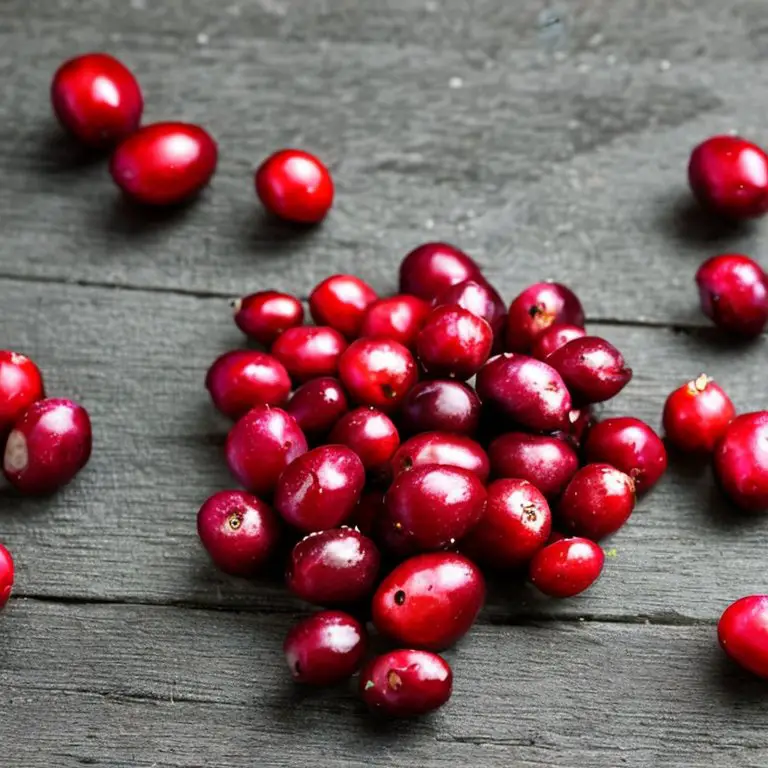
Cranberries are small, round berries that grow on low-lying shrubs. They have a thin, waxy skin and a juicy, tart flesh. Cranberries are a popular fruit because of their tart flavor and high content of vitamins and minerals.
They are often used in sauces, jellies, and other dishes, and can also be eaten fresh or dried. Cranberries are a good source of vitamins C and E, as well as fiber and antioxidants.
Currant
A currant is a small, tart fruit that is often used in jellies, jams, and other preserves. It is native to Europe and Asia and has been cultivated for thousands of years.
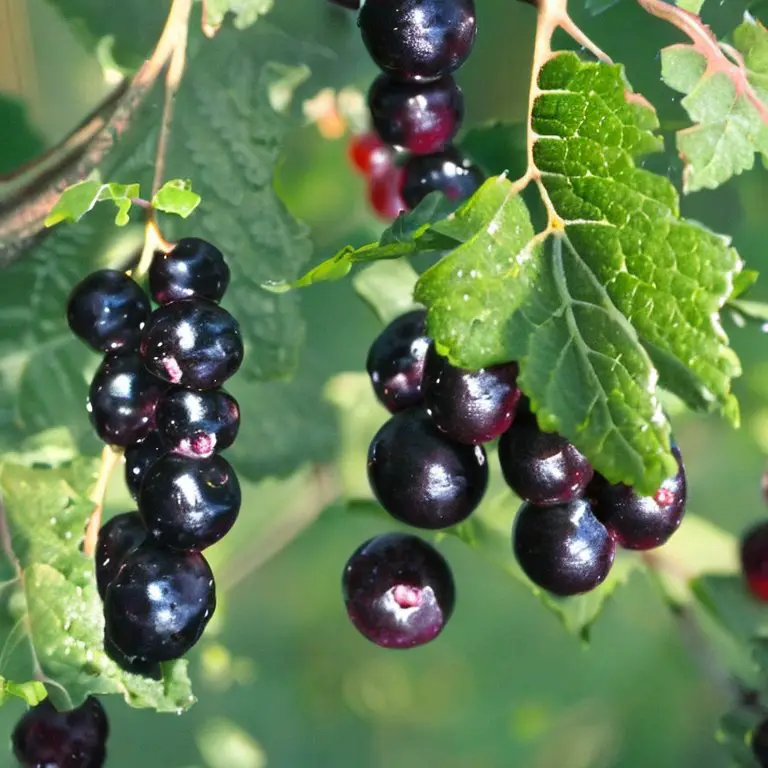
Currants are small, round berries that grow on shrubs or small trees. They have a thin, waxy skin and a juicy, tart flesh.
Currants are a popular fruit because of their tart flavor and high content of vitamins and minerals. They are often used in jams, jellies, and other preserves, and can also be eaten fresh or dried. Currants are a good source of vitamins C and K, as well as fiber and antioxidants.
Crab Apples
This fruit is a small, tart, and often used to make jelly and jams. They are high in Vitamin C and antioxidants.
They also have a unique flavor that makes them a popular ingredient in both sweet and savory dishes. They can also be used to make cider, and it’s a good source of pectin which is a natural thickener.
Cacao Fruit
The cacao fruit, also known as cocoa fruit, is the source of cocoa beans, which are used to make chocolate. The fruit is large, oblong and has a tough, leathery skin that contains a sweet, white, pulpy flesh. The fruit is often used to make chocolate and other cocoa-based products such as cocoa powder, cocoa butter, and cocoa liquor.
Cactus Fruit
Catus fruits, also known as Indian fig, is a tropical fruit that grows on the Opuntia cactus. It has a sweet and juicy flavor and is high in Vitamin C and antioxidants. The fruit is often eaten fresh or used in jams, jellies and syrups.
Cape Gooseberries
Also known as Inca berries, it’s a tropical fruit that grows in clusters on low-growing shrubs. It has a sweet and tangy flavor and is high in Vitamin C and antioxidants. The fruit is often eaten fresh, but can also be used in jams, jellies and syrups.
Cara Cara Oranges
This is a type of orange that has a pink to red flesh, it’s sweet and juicy and high in Vitamin C. It’s often eaten fresh, but can also be used in salads, desserts, and juices.
Vegetables that Start with C
Next, we will look at vegetables that start with the letter “C”.
There are many vegetables that start with the letter “C” that offer a wide range of health benefits and can be incorporated into a variety of dishes. Some of the most popular vegetables that start with “C” include:
Cauliflower
Cauliflower is a cruciferous vegetable that is high in Vitamin C, Vitamin K, and folate. It is also a good source of fiber, potassium, and antioxidants. Cauliflower can be eaten raw or cooked, and it is often used as a low-carb alternative to grains in dishes such as cauliflower rice or cauliflower pizza crust.
Carrots
Carrots are a root vegetable that are high in Vitamin A, Vitamin C, and antioxidants. They are also a good source of fiber, potassium, and beta-carotene. Carrots can be eaten raw or cooked and are often used in salads, soups, and stews.
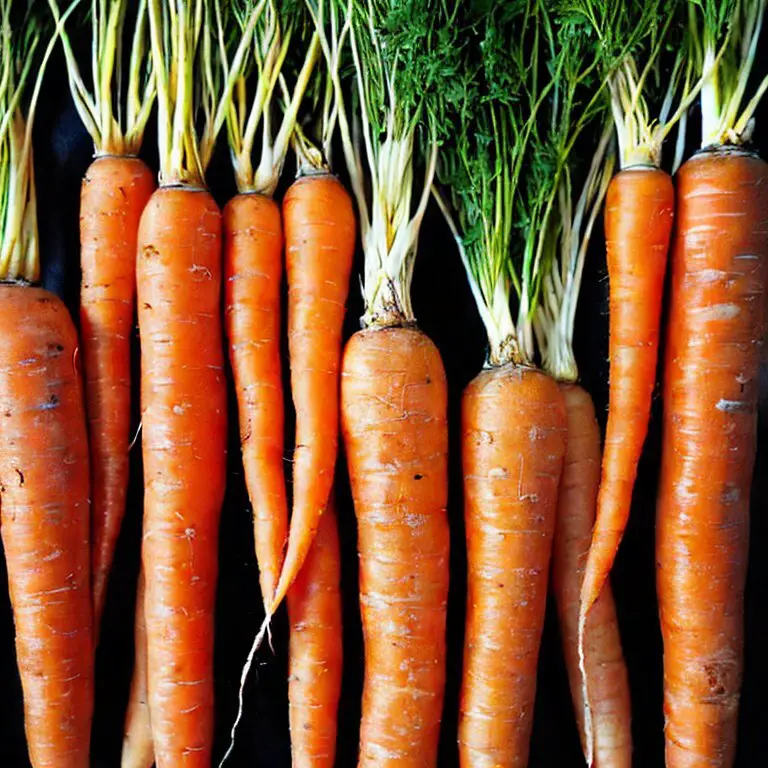
Collard Greens
Collard greens are a leafy green vegetable that is high in Vitamin K, Vitamin A, and Vitamin C. They are also a good source of fiber, potassium, and antioxidants. Collard greens can be eaten raw or cooked, and they are often used in soups, stews, and as a side dish.
Celery
Celery is a low-calorie vegetable that is high in Vitamin K, Vitamin C, and folate. It is also a good source of fiber, potassium, and antioxidants. Celery can be eaten raw or cooked and is often used in salads, soups, and as a snack with dip.
Cucumber
Cucumber is a refreshing vegetable that is high in Vitamin K, Vitamin C, and antioxidants. It is also a good source of hydration, potassium and can help in reducing inflammation. Cucumber can be eaten raw or cooked and is often used in salads, sandwiches, and as a snack.
Cabbage
Cabbage is a leafy green vegetable that is high in Vitamin C, Vitamin K, Vitamin A, and antioxidants. It is also a good source of fiber, potassium, and calcium. Cabbage can be eaten raw or cooked and is often used in salads, soups, and stews.
Chicory
This is a perennial herb that has a slightly bitter taste and is often used in salads or as a coffee substitute. The root can also be roasted and ground to make a caffeine-free coffee alternative.
Coriander
Coriander is a herb that is high in Vitamin K, Vitamin C and antioxidants. It is also a good source of fiber, potassium, and magnesium. Coriander is often used in dishes such as curries, soups, and stews and adds a fresh, green flavor to dishes.
Chinese Broccoli
Chinese broccoli is a leafy green vegetable that is high in Vitamin A, Vitamin C, and Vitamin K. It is also a good source of fiber, potassium, and antioxidants. Chinese broccoli can be eaten raw or cooked and is often used in stir-fries, soups, and as a side dish.
Chinese Cabbage
Also known as Napa cabbage, Chinese cabbage is a type of cabbage that is used in Asian cuisine. It has a mild, slightly sweet flavor and is often used in soups, stir-fries, and pickling. Chinese cabbage is a good source of Vitamin C, Vitamin K, and fiber. It can be eaten raw or cooked and is a popular ingredient in many Asian dishes.
Cardoon
Cardoon is a vegetable that is related to the artichoke, it has a mild, nutty flavor and a slightly fibrous texture. It is a good source of Vitamin C, Vitamin K, and dietary fiber. Cardoon can be eaten raw or cooked and is often used in Mediterranean and French cuisine. It is typically braised, sautéed or fried.
Chives
These are a type of onion that are often used as a garnish or added to soups and salads for flavor.
Cilantro
Cilantro is a herb that has a distinct, fresh flavor and is often used in Latin, Mediterranean, and Asian cuisine. It is a good source of Vitamin K and Vitamin A. Cilantro can be used fresh or dried and is commonly used in salsas, guacamole, soups, and marinades. The root of the plant, called coriander root, is also used in many dishes and has a stronger, more pungent flavor.
Curly Endive
Curly endive also known as frisée, it’s a type of chicory, it’s a salad green that has a slightly bitter taste.
Calabash
Calabash is also known as Bottle Bourd. It’s a type of vine grown for its fruit which is used as a vegetable. It’s high in Vitamin C and Vitamin A.
Fruits and Vegetables Lists
Fruits and Vegetables A-Z
- Fruits and Vegetables that Start with A
- Fruits and Vegetables that Start with B
- Fruits and Vegetables that Start with C
- Fruits and Vegetables that Start with D
- Fruits and Vegetables That Start With E
- Fruits and Vegetables that Start with F
- Fruits and Vegetables that Start with G
- Fruits and Vegetables that Start with I
- Fruits and Vegetables that Start with M
- Fruits and Vegetables that Start with R
- Fruits and Vegetables that Start with X
- Fruits and Vegetables that Start with Y
- Fruits and Vegetables that Start with Z
- Fruits and Vegetables Lists A-Z
Fruits Lists A-Z
- List of Fruits from A-Z (in Alphabetical Order)
- Fruits that Start with A
- Fruits That Start with B
- Fruits that Start with C
- Fruits that Start with D
- Fruits that Start With E
- Fruits that Start with F
- Fruits that Start with G
- Fruits that Start with I
- Fruits that Start with M
- Fruits that Start with R
- Fruits that Start with S
- Fruits that Start with W
- Fruits that Start with X
- Fruits that Start with Y
- Fruits that Start with Z
- 100 Fruit Names (Most Popular Fruits in the World)
- Top 50 Fruits Names List
- Top 20 Fruit Names
- Fruits Lists A-Z
- List of Berries A-Z
- Berries Lists A-Z
Vegetables Lists A-Z
- Vegetables List A-Z in Alphabetical Order
- Vegetables that Start with A
- Vegetables that Start with B
- Vegetables that Start with C
- Vegetables that Start with D
- Vegetables that Start with E
- Vegetables that Start with F
- Vegetables that Start with G
- Vegetables that Start with I
- Vegetables that Start with M
- Vegetables that Start with R
- Vegetables that Start with X
- Vegetables that Start with Y
- Vegetables that Start with Z
- Vegetables Lists A-Z
- 100 Vegetable Names (Most Common in the World)
Lance has been passionate about the plant-based diet and we have been following a whole food plant-based diet for over 5 years. We focus on health, natural healing, weight management, animal rights, and the health of the planet and environment by focusing on whole plant-based foods and sustainable practices.
Learn more at the About Me page and follow on social media at the links below.

